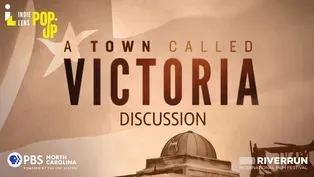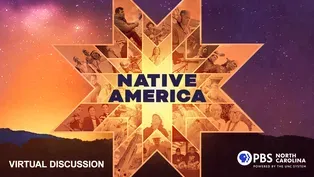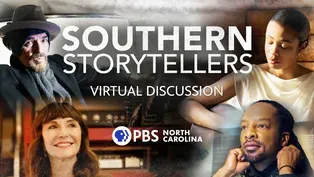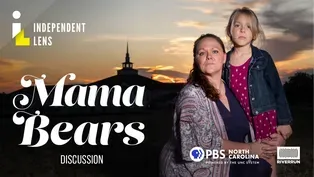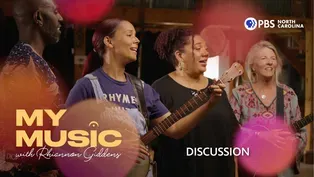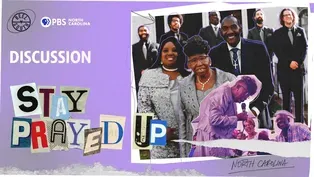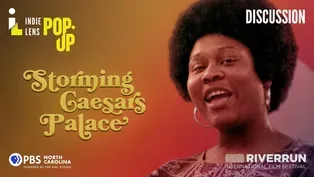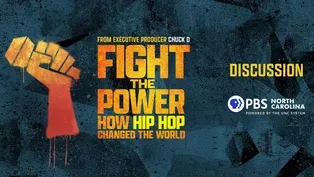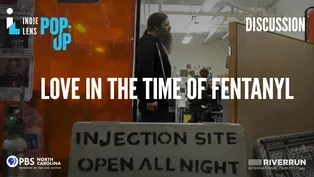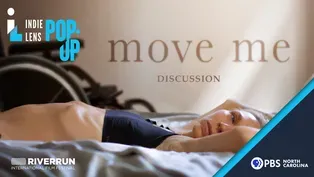PBS North Carolina Specials
Discussion | George H. White: Searching for Freedom
6/9/2022 | 46m 20sVideo has Closed Captions
Panelists discuss George H. White, a powerful Black politician of the Reconstruction Era.
PBS North Carolina’s Deborah Holt Noel leads a conversation with filmmaker Mike O’Connell about the life and legacy of George H. White, eastern North Carolina born political powerhouse and one of the few Black voices of the 55th US Congress. Joining the conversation are historians and authors featured in the film including Stedman Graham, Dr. Crystal R. Sanders, Ben Justesen and Earl L. Ijames.
PBS North Carolina Specials
Discussion | George H. White: Searching for Freedom
6/9/2022 | 46m 20sVideo has Closed Captions
PBS North Carolina’s Deborah Holt Noel leads a conversation with filmmaker Mike O’Connell about the life and legacy of George H. White, eastern North Carolina born political powerhouse and one of the few Black voices of the 55th US Congress. Joining the conversation are historians and authors featured in the film including Stedman Graham, Dr. Crystal R. Sanders, Ben Justesen and Earl L. Ijames.
How to Watch PBS North Carolina Specials
PBS North Carolina Specials is available to stream on pbs.org and the free PBS App, available on iPhone, Apple TV, Android TV, Android smartphones, Amazon Fire TV, Amazon Fire Tablet, Roku, Samsung Smart TV, and Vizio.
Providing Support for PBS.org
Learn Moreabout PBS online sponsorshipMore from This Collection
Discussion - A Town Called Victoria - Independent Lens
Video has Closed Captions
The filmmaker and former Victoria residents share their story. (46m 51s)
Discussion - Native America Season 2
Video has Closed Captions
Panelists discuss preserving the languages of Native American tribes. (39m 1s)
Video has Closed Captions
Sci NC executive producer and host, Frank Graff, chats about upcoming Season 6 of Sci NC. (26m 6s)
Discussion - Southern Storytellers
Video has Closed Captions
Author David Joy and others discuss storytelling and their new PBS series. (42m 13s)
Discussion - Mama Bears | Independent Lens
Video has Closed Captions
Producer and director Daresha Kyi discusses the film and LGBTQIA+ advocacy. (34m 41s)
Discussion - My Music with Rhiannon Giddens
Video has Closed Captions
Discussing the series with producers Will & Deni McIntyre and country artist Rissi Palmer. (39m 56s)
Discussion - Free Chol Soo Lee | Independent Lens
Video has Closed Captions
Local lawyers, professors and nonprofit leaders discuss wrongful convictions and reentry. (40m 44s)
Discussion - Stay Prayed Up, Reel South
Video has Closed Captions
The filmmakers discuss their journey with Mother Perry and The Branchettes. (45m 4s)
Discussion - Storming Caesars Palace | Independent Lens
Video has Closed Captions
Local professors and nonprofit leaders discuss welfare and the social safety net. (33m 2s)
Discussion - Fight the Power: How Hip Hop Changed the World
Video has Closed Captions
Local experts discuss the history of hip hop with PBS North Carolina. (59m 43s)
Discussion - Love in the Time of Fentanyl | Independent Lens
Video has Closed Captions
Local harm reductionists, therapists and others discuss the opioid crisis and more. (55m 44s)
Discussion | Independent Lens: Move Me
Video has Closed Captions
A dancer with blindness and disability advocates discuss adaptable arts programs. (38m 46s)
Providing Support for PBS.org
Learn Moreabout PBS online sponsorship- Good evening, everyone, and welcome.
Thank you so much for joining us.
My name is Deborah Holt Noel.
Some of you may recognize me from the program "North Carolina Weekend."
I enjoy hosting that program, which is coming up a little later this evening, but I am also proud to produce and host the weekly program "Black Issues Forum," a platform for Black voices in North Carolina, and we address topics from healthcare to education and politics, representing the community, and encouraging a range of perspectives.
But right now, tonight, we reach deep into North Carolina history to reveal an undertold story, the life and legacy of George H. White.
His story touches current events in every way, and that's what makes this a very powerful film.
I can honestly say, I didn't know a lot about George White before this documentary and in recent years, but I certainly should have.
In fact, we all should have, and that's what PBS North Carolina strives to do every day is spark lifelong curiosity and inform, educate, and empower our communities and enrich the lives of all North Carolinians and beyond.
We are joined this evening by some very outstanding and special guests.
First, a friend and colleague who certainly cares very much about history, about accurate and authentic storytelling, and he is an award-winning filmmaker, and he's the filmmaker of the documentary that you just watched this evening.
His name is Mike O'Connell.
I'm honored to introduce you, Mike.
Welcome to the program.
We also have- - Hi, everybody.
- [laughs] We also have Dr.
Crystal R. Sanders, author, historian, and professor at Penn State University, Earl L. Ijames, curator of African American history and agriculture at the North Carolina Museum of History.
We also have Ben Justensen, historian and author of "George Henry White: An Even Chance in the Race of Life," and welcome, welcome, Ben.
We also have Mr. Stedman Graham, author, educator, speaker, and very well recognized.
Stedman, welcome to the program.
Welcome to all of you.
We really appreciate all you spending the time to get these questions and have this conversation.
- Thank you so much.
- Well, let's get right down to it.
I wanna open up with you, Mike, because I know as a fellow filmmaker and storyteller rather, that producers sometimes know what we're getting into with a story, and sometimes we discover the story along the way.
With the George H. White story and this project, what was the story that you determined needed to be told in this documentary?
- Well, thanks, Deb.
Basically, I became aware of this when our then, we had a content director, Travis Mitchell was doing work in New Bern, and he handed me Ben's book and said, "We need to do something on him, George Henry White."
And that sort of started it.
I guess I would say that after reading the book and researching, he's well known to historians, he's well known to African Americans, especially in the New Bern area, but when I saw that book and the story there and realized there hadn't been a lot done on him, it started the path, and we, that was several years ago.
We got through two pandemics, political upheaval, and as Earl says, and others, you know, I think this is the right time for it to be done.
And his story to me is one of courage and optimism and never giving up and that he really, really loved America and everything that it showed possible.
- Absolutely, very timely story, especially considering everything that we're witnessing and experiencing in our society today.
I enjoyed the film very much.
It's so informative.
Anyone who's a teacher out there of history, a teacher of North Carolina history has got to share this story with their classroom.
It needs to be known.
It is indeed undertold.
And that brings me to you, Dr. Sanders.
The film opens with you saying that you believe that his story is one of the most undertold stories, that he's one of the most understudied persons in US history.
Can you kind of explain why you said that?
- I will, and thank you for having me.
Let me begin by just helping us to think about the fact that Representative White was the last African American to serve in Congress in the 19th century and the first African American to serve in Congress in the 20th century.
And that is significant because that means for two terms, he's the only African American in Congress, and that means he is representing the voices of not just the people of the Second District, but he's representing the voices of 10 million African Americans nationwide.
And we have to ask ourselves, what does he do when he goes to Washington DC?
Knowing the political climate, knowing the tense race relations throughout the country, he could've played it safe.
He could've gone to DC, attempted to, you know, go about his congressional duties and take care of constituent responsibilities without raising any concern for the issues of racism, without raising any concerns for white supremacy that's really running rampant throughout the country.
Yet, he does just that.
He takes to the floor time and time again, really trying to push the United States closer to its professed ideals of liberty and justice for all.
I love that the documentary mentions that the federal anti-lynching bill that Representative White introduced in 1900, that is the very first federal anti-lynching bill that's ever introduced in Congress, and we know it would not be until March of this year, March of 2022, that the United States Congress passes a federal anti-lynching bill.
But it is crucial that he uses his platform, uses his opportunity, uses his stature in 1900 to put this before the nation's conscience, right, to say, "I'm not gonna be silent."
We have to remember that he is coming from North Carolina, coming from the state of the Wilmington massacre.
It is quite dangerous for him to say, "I'm gonna use my platform and use my voice to really show the nation that we have work to do," to really take it to white supremacist politicians who don't want him in Congress anyway.
Yet he's not only there, but he's there using his voice and using his platform to really bring light to the situation of African Americans across the South are finding themselves in.
And it's not just a federal anti-lynching bill that he champions, but it's a host of things that he does during his two terms in Congress to really put forward the concerns of African Americans and to really remind the nation that African Americans are citizens who are entitled to the protections and the benefits of citizenship, just as white Americans were.
And we see this in a host of ways.
He tries to secure money for an exhibit really profiling the achievements of African Americans at the Paris Exposition in the early 20th century.
We see that he's trying to secure money for the family of the Black postal worker who was killed in South Carolina.
There's a host of things that he's doing to not only represent the interest of African Americans in the Second District, but he's really representing the interests of African Americans across the country, and in doing so, I say he's representing the interests of all Americans, because he is trying to help the United States to really live up to these professed ideals that we still cherish and champion today.
- You have said a mouthful, and it's so true.
It is such an example of courage, what George White did while he was in office.
It's the type of courage that it is really difficult to see in action today.
And that brings me to you, Earl, because, you know, one of the things that, I'd love your reflections on what Dr. Sanders just said, because even in the documentary, you said at the time, we were so far away from democracy.
But I want you, I would love your thoughts on what she said and that statement that you made in the documentary.
- Well, thank you again for having me, and thank you, Crystal, for crystallizing that for us.
The time of the late 19th century, where America at the end of the Reconstruction or the post-Reconstruction era wanted to literally tear away the gains of people of color, particularly African Americans, and that had been done successfully literally across the country, not only in the South, across the entire country.
It's important to note the majority of African Americans still lived in the South at that time.
There had been a small migration during the 1870s, mainly out to places like Kansas, but the mass exodus to the cities in the North had not begun.
So to the point is that most of the injustices that were being heaped were being heaped upon the African American population in the most abhorrent ways.
And it was also fair game for any white person who agreed or supported the same notions and the same politics as Congressman George H. White, they would suffer a similar fate.
We found records, I found records of many whites who had been lynched at this same timeframe.
And so the anti-lynching bill obviously is aimed at many of the people who were lynched who were of color, but this is an American tragedy that is going on, too, because the lynch mobs are going against anything that is a biracial coalition, as David Cecelski pointed out, to tear down that American possibility that should've been after the Civil War.
And so if you come back to North Carolina, our governor at the time of Congressman White's tenure, 1897 through 1901, was Governor Daniel L. Russell from Brunswick County, North Carolina, below Wilmington.
And he had the support of that populism fusion team of white farmers, the farmers alliance, Black farmers, the Republicans, and yet his plantation in Brunswick County, he had a rice plantation, he had to dress in disguise to ride on the train between Raleigh and Wilmington for threat, this is the governor of North Carolina, for threat of being literally abducted or assassinated.
And so the injustice had gotten so out of hand that the folks who were planning the coup d'etat in 1898 were almost doing it out in the open, not unlike the contemporary events that we recently experienced at our United States Capitol on January 6th of 2021 and how many of those events unfolded right before our eyes was similarly, the same thing happened.
And just lastly, I'll end with White, and I like to point out, and you know, that George H. White was considered and was vilified long before he became a congressman and even before he was United States solicitor.
When he earned his law license in New Bern in 1879, the legislature immediately took Craven County out of the Black Congressional Second District.
And in my humble estimation, the main factor for having done that was this eloquent, charismatic, powerful man George H. White earning a law license in 1879 was perceived as a threat.
And so as a direct result of taking Craven County out of that Black Congressional Second District that was gerrymandered in 1870, we get formed these new counties of Durham in 1880 and Vance County on the Virginia border with Henderson, North Carolina, is in 1880 as a means to offset and hopefully keep George H. White from being the congressperson that he later became out of Tarboro, North Carolina, and Edgecombe County.
So there are lots of parallels there between today and then, and not even to mention the Emmett Till Antilynching Bill that has finally been passed and recognized as a crime that has been going on literally for centuries in America.
- Thank you, Earl, you know, if I'd had these stories and you two as professors when I was learning history, I might've actually been interested in it, and I think that maybe a lot of young people would find it to be the same.
You have to draw the connections, and the story of this individual who lived right here and served in North Carolina I think makes the history real.
It also helps anyone, any learner of history to make the connections.
I wanna bring you in, Ben, because without your book, which was probably a guiding light for Mike in doing the documentary, we wouldn't have gotten as much of this incredible story out.
So thank you for your book, which is titled "George Henry White: An Even Chance in the Race of Life," and you authored that book back in 2001.
So over 20 years ago, you realized how important it was to have, to tell the story of White's life and his legacy.
What was your first reaction when you learned that this is coming to public television?
- Oh, I was delighted.
I had been wanting someone to do it, someone to make a documentary, a longer one about George Henry White and was so happy when Mike contacted me and asked if I would be willing to participate in it.
I think one of the amazing things to me about George White, and this film catches the essence of him, is something that is overlooked when people remember him.
They've heard some of the stories about him, and they understand that he was all but driven out of office.
He chose not to run again in 1900, so he only served two terms.
But he never gave up.
He was the eternal optimist.
Most people who had gone through the terrible things that he went through and watched what happened in Wilmington all might have been discouraged and never had another thing to do with politics.
He did change, he went to live in Philadelphia after living in Washington, and he decided that if he could not get the message across on the national scale, if he could not accomplish what he had hoped to accomplish in Congress, that he would do something different on a smaller scale, and that was where the dream of Whitesboro came about.
He created this town as a small example of what Black people could do on their own.
He never expected it to turn into the wonderful little community I think that it has become today, because he had other ideas about it.
But he wanted to inspire people to take credit for their own abilities and to create their own lives.
That's what Whitesboro is all about, once- - And that's a great, that's a great segue because I wanna bring in Stedman Graham, thank you so much.
But I wanna bring in Stedman Graham because you were born in Whitesboro, as we learned in the film, small all-Black town in New Jersey founded by George H. White after Blacks were disenfranchised and basically, as Ben said, prevented from voting in the South.
So here they were politically disenfranchised, but George White goes to another state and creates an opportunity, an economic opportunity.
Can you share a little bit about what you remember of Whitesboro, what it was like, and what it's like today?
- Yeah, Whitesboro, I mean, it's a pleasure to be from Whitesboro, number one.
We have a lot of pride because it's an all-Black town surrounded by a white county, and we used to hear, "Nothing ever good comes outta Whitesboro."
And so growing up with teachers in the segregated school that would teach us, who were really concerned about us and loved us and supported us, you know, that was a luxury, I think for, especially in my own personal life, and to have my family, a lot of family members there and for George H. White to be a part of our family, the Spaulding family, to me, it gave us a lot of pride.
We started, a number of us started a organization called Concerned Citizens about 33 years ago, which is still going on today, to be able to get street lights and sidewalks and running water through the town and sewage and all the things we didn't have to continue that dream that George H. White had of independent development.
And I'm just so glad that we have this documentary.
Mike, thank you so much for the work that you've done and Dr. Sanders and also Earl and Ben, who has been unbelievable in writing this book and the history of Whitesboro, because it allows us to continue the process of recording our own history so we don't lose that.
And thank you, PBS North Carolina, for showing this.
It will continue to kind of be a flame to empower the people in Whitesboro and other people who see this as a way to celebrate such a great man.
So I'm really over the top in terms of this, what we're talking about this afternoon and what's been shown.
- I would absolutely agree, and I- - And Deb, thank you so much for what you do, appreciate you.
- Thank you, thank you very much.
And I think we have audience members who are very excited about this content.
They're already asking questions.
So I'm gonna share some of those.
Here's one, "While George H. White never returned to national politics after leaving Congress, did he continue to advocate for civil rights in his post-congressional life?"
That might be a question for you, Ben, or perhaps Dr. Sanders.
- I'll give you a quick answer, yes, he was very active, both in the National Afro-American Council, which was the precursor of the later NAACP.
He was very active in the Constitutional League of the United States.
He traveled, spoke eloquently everywhere that he went, encouraging people to continue to fight for their rights, for the restoration of their rights in the South.
And he remained, in one of his speeches before he died in 1918, he said that he was going to have a codicil added to his will saying, "We will carry on the fight in the next life."
I haven't found his will, so I don't know if he actually said that, but that's what he said he was gonna do, and I believe it.
- We certainly are grateful that he was fighting in the beginning and that he continued the fight.
And I'm just curious, I wanna bring you back in here, Mike, because it can never be easy to talk about sensitive issues and tell the stories and do it in a way that people will understand and not feel preached at.
But as we talk about, you know, the fact that this story included coverage of the Wilmington race riots, not the riots, but the massacre that occurred in 1898, they're difficult topics.
Can you elaborate on your process and how you wanted to treat this history, the story and these sensitive issues and subjects?
- Sure, I guess the easy way to answer that is this movie, this documentary features these three historians, Crystal and Ben and Pearl, and they are all kinda native North Carolinians.
And basically any one of them, you just sort of put the camera in front of 'em and let them talk, and you pretty much have a movie.
[laughs] I mean, they're so brilliant and helpful.
So basically it's just trying to, for me at least, to answer your question, was this incredible resource of these gifted historians and authors and just trying to pare it down to, you know, you could do an hour just on Whitesboro.
You could do an hour on what happened at the, you know, with the guy who got the seat that George Henry White vacated.
But I guess the answer is the process is just get really good historians to talk with you, and they do all the heavy lifting, I mean, while you're just kind of, you know, just stand out of the way.
- Well, they definitely provided some incredible, you know, context and continue to do so, even in this follow-up conversation.
We have another question I wanna share.
"Since George H. White created an autonomous Black community to create economic self-sufficiency, was he strongly influenced by the arguments of Booker T. Washington and W.E.B.
Du Bois?"
That might also be for you, Ben.
- He was, yes, he was influenced by them.
They did not agree on all issues.
Part of the problem that was developing at the time was that the Black community in the country was fractionalizing along philosophical lines, and Booker T. Washington was at one end of the spectrum, and W.E.B.
Du Bois was at the other.
George White was sort of in the middle.
He was trying to take the best of both sides if he could.
He did emulate Tuskegee in creating Whitesboro, but the one thing that he might've done looking back on it and did not do, he could've created a college there.
I wish he had, I think it would've been a great place to build one in New Jersey.
And he tried to the best, to his best, till the end of life to listen to all sides and to try to present a good synthesis of all viewpoints, I think.
- Earl, was there something you wanted to add?
- Ben hit the nail right on the head.
You know, he was neither Booker T. nor W.E.B.
Du Bois, but he was capturing both and taking the best of both and going forward and not so much based on Tuskegee or anyplace else, but those types of autonomous communities like Wilmington, which is one of those original, the original Black Wall Street that we talk about.
There were Wilmingtons, New Bern is another example, Tarboro, the original Washington, and Washington, North Carolina.
These are majority Black communities that were very prosperous, both inside and outside of the Black Congressional Second District.
A good example, we talk about Tuskegee.
Tuskegee in and of itself gained a lot of its notoriety from the first Black architect or the first Black graduate of MIT, Robert Robinson Taylor, who's a Wilmington native and who was run out in the coup d'etat in 1898, and he winds up out in Alabama, and Booker T. actually grabs that element to help design largely Tuskegee Institute.
So the question should be in reverse because I think nationally, a lot of people think that these thinkers like W.E.B.
Du Bois and Booker T. Washington were somehow exclusive in their thought.
And again, as Crystal pointed out, right in the middle, right in the middle of all of our eyes is Congressman George Henry White, who quite frankly was head and shoulders above both.
- I think it's really interesting, the concept, Stedman, that you talked about regarding group economics and how there were so many communities that likely were built around this concept of group economics.
But then we also know that many of these communities did not last for various reasons.
And I think I want your reflections on this as well as Dr. Sanders.
Here's a question, and I think it's related to that, and someone wants to know, "Is there documentation for how many town, cities, areas that were predominantly Black and thriving ultimately destroyed during Reconstruction, Jim Crow era, Dwight D. Eisenhower, the interstate project?"
Is there any sense of how many or what percentage of those were destroyed by that kind of thing and why?
Start with you, Dr. Sanders.
- Thank you, I don't have an exact number of towns and communities that existed.
I know there are many scholars doing that work, including a good friend of mine who's a professor at Elizabeth City State University here in North Carolina, and she's working on Boley, Oklahoma, which was one of the most important kind of all-Black communities out west.
And what I'll say about these communities is that these are examples of Black aspiration.
There are examples of Black self-determination, and they're really a threat to white communities in the sense that many of these towns have all Black elected officials.
These are towns that have, you know, schools and local governments that are controlled by Black people.
These are Black people writing the checks, Black people making the decisions about hiring, and really what these towns represent is the notion that African Americans have the ability to take part in the democratic process, right?
If they have the ability to run these small towns, they have the ability to take part in the democratic process, to take part in the electoral politics, to be able to engage in political activity at a state level and at a federal level.
And these are the things that were threatening to white supremacists.
So for these types of reasons, these are why many of these towns no longer exist.
They are literally run out of town.
They are literally burned to the ground because they are such symbols of what the United States could be if it lived up to its ideals of democracy, if it lived up to its ideals of liberty and justice for all.
And I'm not trying to take the conversation in another direction, but one of the things that I've been sitting here thinking about is Representative White's last speech.
When he gives that speech in 1901 and says, you know, "We'll be back," we have to think about what that means.
We have to think about all of the Black congressmen and congresswoman who have come after him.
You know, when he leaves DC in 1901, it won't be until 1928 when the African Americans in Chicago elect Oscar De Priest, right, who takes office in 1929.
And then we think about, if we think about North Carolina in particular, we go all the way until 1992, when once again, that Second Congressional District sends us Eva Clayton, and she comes to Congress, and what does she do?
Just as Representative White had done in 1897, she joins the agriculture committee, a very important committee given the rural nature of Northeastern North Carolina, and she's really concerned about economic inequality, an issue that Representative White was really concerned about because we know the many ways in which African Americans were struggling to secure employment, struggling to secure decent jobs and decent homes.
And in that same way that these were things that concerned Representative White in the late 19th century, we see Eva Clayton concerning herself with these issues in 1992.
And there's a direct line, and it actually gives me chills because, you know, Representative White says, "We will be back," and indeed we did come back.
And in many ways they were carrying on the work that he had started, carrying on that legacy of saying, "We can't come to DC and forget why we're here.
We can't come to DC and forget who sent us."
And so really, you know, there's a, when I think of the Congressional Black Caucus, and I think of all of the work that has been done by that body to really bring awareness to issues affecting marginalized Americans all across the country, you know, Representative White gave us the blueprint, right?
He gave us a model for how that can be done when, as people in the church would say, in season and out of season, right, whether it's popular to bring up certain issues.
If the United States is at war, do we talk about domestic problems?
If the United States is attempting to present a united front internationally, do we bring up, you know, the issues that are going on in our backyard?
And we see that Representative White did that, and he did that so well that he left this legacy of really being able to champion the affairs of those who have been disenfranchised, those who don't have power and don't have money and don't have name recognition.
And we see that there are still congresspeople doing that today, and so that's really a legacy and a testament to his work.
- And I think what Dr. Sanders says is so, so good.
You know, I love the fact that you're talking about George H. White understood that this is a socioeconomic development issue.
And even today it comes down to self-empowerment.
It comes down to the power against the powerless and what does that actually mean.
That's an economic issue.
We live in America, the greatest country in the world.
We need to have opportunities like everybody else.
What does that look like?
You know, freedom really is about and democracy is about understanding the capitalistic system and how the American freedom enterprise system works and how that's gonna apply to your development.
You probably couldn't have a better time than today to have the opportunity to self-actualize because we have access to technology, and we have access to systems, and we have access to self-determination.
We may not have the mindset to be able to do that, which is what he was bringing to the table is that he wanted to change people's perception about themselves, and he wanted them to represent themselves, and he wanted to create a self-help philosophy that would allow them to create their own and produce their own so they would understand how to take information and education and make it relevant to their purpose in life, to their mission in life so they could be a cognitive thinker, be educated and understand the true meaning of how to become an American citizen and that equal rights is available to all of us if we take charge of our own personal and professional development, and that starts at home.
- Well, as far as towns go- - Quite a statement.
I'm gonna give you about, I'm gonna give you about 30 seconds, 'cause we're close to time, and I wanna ask one more question, Earl.
- Just 30 seconds, because I wanna particularly answer that question about the Black communities and Black towns.
Here in North Carolina in particular, we have Black communities and Black towns dating back to the 1600s and the 1700s.
New Bern itself is overlaying over top of some older the Black communities.
So when we're talking about quantifying a number, it is nearly impossible because it's over those longer spans of time, particularly in a state like North Carolina that existed 150 years before the United States existed.
So that's one part, but the second part, the whole objective of the Wilmington coup d'etat and the Black Congressional Second was to eradicate what was going on on a very large scale across majority Black counties in Eastern North Carolina, and that is self-sufficient, economically strong, viable agriculturally based communities that were also sending their children to the Shaw universities, to the Elizabeth City State universities, to the North Carolina A&T State universities here in our state, North Carolina, where we coupled that with the largest number of historical Black colleges and universities.
So there was a lot of autonomy that was the aim of that ire of the white supremacy campaign.
But the North Carolina legislature itself aimed, beginning in the 1870s, to micromanage these majority Black communities, and so we never really, I don't think possible to get a clear, absolute number because they're in constant flux.
They're constantly being burned, constantly shifting, constantly moving.
And so we have to understand the nature of these communities because many of them grow out of almost literal Maroon communities.
- That is just incredible.
Thank you for insisting on bringing that information and because it is vital, and we probably have time for just one more question, and I think it's super important.
What incredible history this is.
What is the best way to get this into the hands of school kids, of schools themselves, of individuals who would want to know this history?
I'll give each of you a few seconds, starting with you, Ben.
- I would love to come and speak to every class in North Carolina if I had the time and were here, just to tell 'em the story of George White, the simple story and of what determination and empowerment can do for one man's life and spread throughout the rest of the country.
I think people just don't understand how important that is, I don't think.
- Dr. Sanders, how do we get this information into classrooms and into history books?
- Oh, first of all, I think Ben's book is an excellent entry point for older students in particular.
Being able to read a biography of Representative White's life and really engage in conversations about his work would be exciting and very timely, especially for I would think high school students and college students.
But for younger students, one of the things I love doing is showing images, showing an image of the 56th Congress, where they could see this lone African American member, right, sitting among a host of white male representatives from across the country and using that as an entry point to talk to these students about who is this man, what did he do?
How did he get there?
I think another way to get to talk, to introduce him to students would be to share his 1901 speech, giving students the opportunity to read that speech out loud.
Maybe teachers engage their students by having the class each, you know, having every student in the class to read part of the speech and then using that as a starting point to discuss who was this man, what does he mean?
Why does he say, "Phoenix-like, we will return"?
Why are they leaving, what happened, right?
That's a way that you can engage students by using those primary sources as a starting point to have a larger conversation about American history, about race in the United States, about disfranchisement, about North Carolina history, about the role of African Americans in pushing this country forward and closer to its professed ideals.
There are all, you know, there's all kinds of conversations that could be had using a primary source such as a photograph or a speech.
- I love that idea.
Thank you so much for sharing that.
Earl, getting this into classrooms and more history books.
- Well, first of all, I wanna thank you again and Mike for producing this documentary, because this is a good point, with the short learning span of many of our students, 30 minutes is perfect to get this in and spark that intuition.
But secondly, as museum curator, a lot of this also came out of the "Freedom!
A Promise Disrupted" exhibit that I curated and created that's currently touring the state that gives, "A Promise Disrupted: 1862 through 1901" and kind of encapsulates this in an exhibit format where we at the North Carolina Museum of History have the opportunity to have thousands of school children and their parents and other schools and educators who visit us year-round at the Museum of History and our sister museums in Fayetteville, in Elizabeth City and at the Maritime.
So that's another way, but then lastly, for those who are watching this live, we're gonna screen this again Friday the 17th for Juneteenth at the North Carolina Museum of History as part of the Juneteenth celebration and commemoration of freedom, celebration of freedom and commemoration.
So there's those ways, but also, I would encourage everyone, particularly as Crystal says, to ask parents, older relatives, elders about primary sources.
What are those primary sources?
Artifacts like George H. White's sword that Ben and Stedman were so very gracious to, Stedman offered that to the museum as an artifact, the only known artifact to Congressman George H. White, and the National Museum in Washington, DC, now can spread the story, so primary sources like artifacts, documents, photographs.
- Absolutely the documents.
- Just that whole list.
- Primary sources.
- Yes, so thank you.
- And being able to actually go to the museums and see these exhibits and hear from experts like yourself.
I love that, I love that suggestion, the primary sources, visiting our historic sites.
Stedman Graham, recommendations for getting this information into books, into classrooms.
- Well, certainly the content is worthy of that.
You couldn't have a better opportunity than now to do that because we have access to technology, and we can reach millions of people around the world, so being able to put it into some kind of a format that could be downloaded to anywhere, anyplace through a technological platform or program, to me, is very exciting, you know, having a website dedicated especially to George H. White that would disseminate this kind of history, YouTube channels, all of those things that are relevant to disseminating content.
So this is the time to do it.
So I think this is a great start in determining how this would be disseminated to people that would help them to be able to understand the power of self-determination.
This is not just for African Americans.
This is for everybody who- - Absolutely.
- Who would understand the principles and the need to be able to be self-sufficient.
This is the age of identity today when people have access to technology and have the ability to understand who they are and to be able to brand themselves in the marketplace and take control of their own development and their own social and economic opportunities.
And so you couldn't have a better opportunity than today to do this.
- And why not take it to TikTok, right?
Mike, thank you so much for your diligence and for your interest in history and just for your talent in storytelling.
You know, what is your hope for getting this disseminated and into the hands of more individuals?
- I think we've done the first step, which is, you know, have this, and this film was really kinda created and paid for by the people of North Carolina, and it'll be on our web servers streaming for free, and any teacher that wants to play a part of it or some of it or use it in her lesson plan or his lesson plan, have at it.
And I've also found making projects like this, they kinda develop a life of their own, and I think once people get to hear Crystal and Earl talk about this history with such passion and intellectual rigor, like this is like, hopefully it just keeps spreading.
- Well, we are out of time, and I wanna thank Dr.
Crystal Sanders, Earl Ijames, Ben Justensen, Stedman Graham, and Mike O'Connell for your time, for your diligence, for your hard work, talent, and interest.
Thank you so much for your time this evening.
And I wanna thank all of you and our audience for tuning in and for sending in your questions and being a part of this conversation.
I wanna thank our event partner, RiverRun International Film Festival, and please watch "George H. White: Searching for Freedom" again on Tuesday, June 14th, at 8:00 PM on PBS NC.
You can stream it at any time online, as Mike said, and on the PBS video app.
Please be on the lookout for an email early next week with a link to tonight's discussion, when and where to watch the film, resources, information about upcoming PBS North Carolina events and initiatives.
And you can see me, Deborah Holt Noel, along with guest host Kenia Thompson on "Black Issues Forum" every Friday evening at seven o'clock on PBS North Carolina, and you can be a part of the conversation each week about the current events that we are talking about.
And on a lighter note, certainly please join us for "North Carolina Weekend" every Thursday night at 9:00 PM on PBS North Carolina and the PBS video app or wherever you want to watch the program, maybe on your device.
So to ensure PBS North Carolina continues to bring you popular PBS shows, riveting documentaries, informative how-to programs, and fun lifestyle programs, Rootle, our 24-hour kids channel, and free informative screening events like this one, I hope that you are inspired and encouraged to make a tax-deductible contribution to PBS North Carolina.
You can do that safely and securely online at pbsnc.org.
